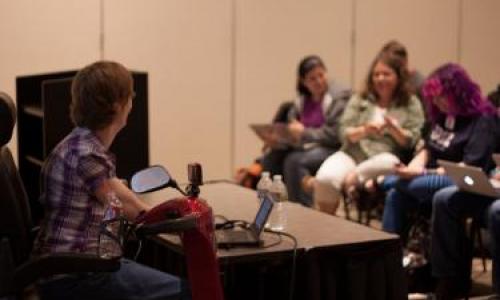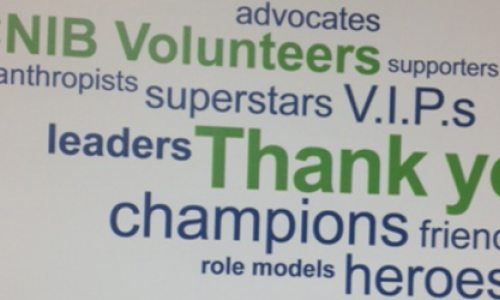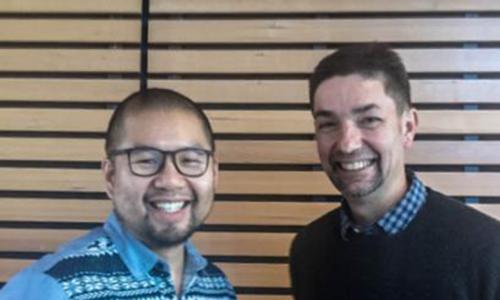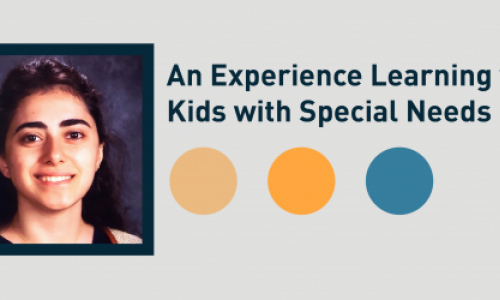Throughout my four years at SFU, my work and volunteer experiences have always been focused towards one specialty field: working with individuals with disabilities. Since applying to the Kinesiology program at SFU, I knew that I wanted to one day work as an Occupational Therapist, a rewarding career that is geared towards developing and maintaining everyday life skills for people with cognitive, physical or mental disabilities. During my undergraduate degree, I dedicated my time towards learning more about this field through firsthand experiences. My journey first began with Vancouver Adaptive Snow Sports where I integrated my love for skiing into my career path. I volunteered as a ski instructor teaching students with a range of developmental and physical disabilities and shared with them my love for such an exhilarating sport. This positive first experience quickly snowballed into more recreation-based work: adapted aquatics and summer camp programs. Then the time came for me to apply for a summer co-op position. I had had my fair share of experiences working in the recreation field and decided it was time to expand into the realm of teaching life skills.
Fast-forward to my first day as a Program Worker at the West 8th location of Developmental Disabilities Association (DDA), a non-profit Adult Day Program. This year-round program creates an opportunity for young adults with disabilities to learn life skills in a practical and hands-on setting. The days always start off with a team meeting, with all eight full-time staff congregating in the front room, and my first day was no exception. After some brief introductions, the morning meeting commenced and I quickly found myself caught in a whirlwind of dialog. Names, acronyms and duties were listed out as the daily class schedule was finalized. With little training and knowledge of the workplace, I was overwhelmed. I spent the majority of my first week shadowing the full-time community support staff in their classes and outings, and with the help and support of my colleagues, I began to learn the ropes. As the weeks progressed, I discovered what made this day program so unique from others.
The program at DDA West 8th is very client oriented. It focuses on helping young adults with developmental disabilities gain greater independence and quality of life through participation in community-based social, recreational and vocational activities.1 It is especially important to teach these social skills as research has shown positive impact on peer acceptance, emotional well-being and levels of self-esteem and self-confidence.2 Rather than just learning skills from the books, this program strives to integrate job and life-ready skills through hands-on activities. Staff-led classes teach concepts such as street safety in the neighborhood, grocery shopping to learn to be price conscious, and transit planning. The goal of the program is to help these individuals become more independent and to ultimately find a job in the near future.
To compliment these classes, staff arrange for weekly volunteer positions for the clients at places including the Canadian Cancer Society, Maple Wood Farm, and child care centres, to name a few. In a work place setting, clients are guided to understand time management, following instruction and responsibility. These are all skills that can be applied successfully for the participants when they are transitioning into the world of employment.
Teaching life skills to clients with developmental disabilities allowed me to see this field in a different light. Rather than just focusing on how to teach a motor skill, I was able to branch out and learn to teach independence, which was on a whole different spectrum compared to teaching sports. Throughout these few months, I was required to take my existing knowledge on teaching and adapt it. I had to integrate client interests to make class learning educational, yet fun and engaging. Through these challenges, I have learned conflict resolution, positive reinforcement and redirection skills that are unique but very applicable to future positions. In addition, this job has allowed me to apply my academic knowledge to the workplace. I was able to connect my academic and professional worlds by using my education on developmental disabilities and psychological disorders to develop a deeper understanding on teaching and behavior management. Using my knowledge, I had the opportunity to create a lesson plan and class placements for new clients, based on ability levels and behavior profiles.
My summer position with DDA has been a rewarding experience. Not only did this program assist clients in developing abilities in their day-to-day lives, it also helped me discover my own abilities in leadership and conflict resolution. This unique opportunity was a great stepping-stone for my personal development into becoming an Occupational Therapist; the behavior management skills learned here will definitely be carried forward as I pursue my career in this field of developmental disabilities.
References
-
"Adult Services." Developmental Disabilities Association. Accessed July 12, 2016. http://develop.bc.ca/for-families/adult-services/#day-programs.
-
Elksnin, Linda K., and Nick Elksnin. 2003. "Fostering Social-Emotional Learning in the Classroom." Education 124, no. 1: 63-48. Academic Search Complete, EBSCOhost (accessed July 26, 2016).
Beyond the Blog
-
Curious about what other co-op opportunities are available for students in Biomedical Physiology and Kinesiology? Visit the BPK co-op page!













